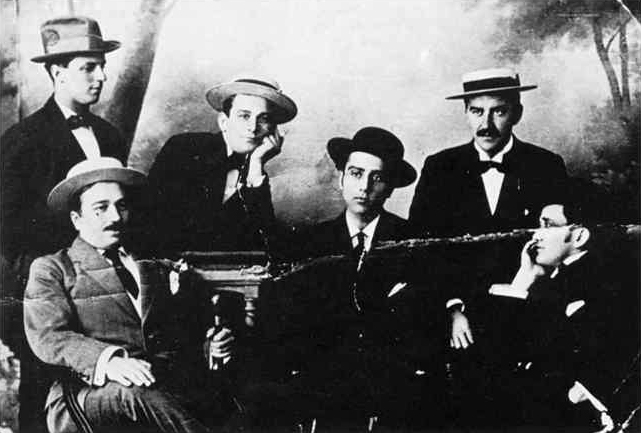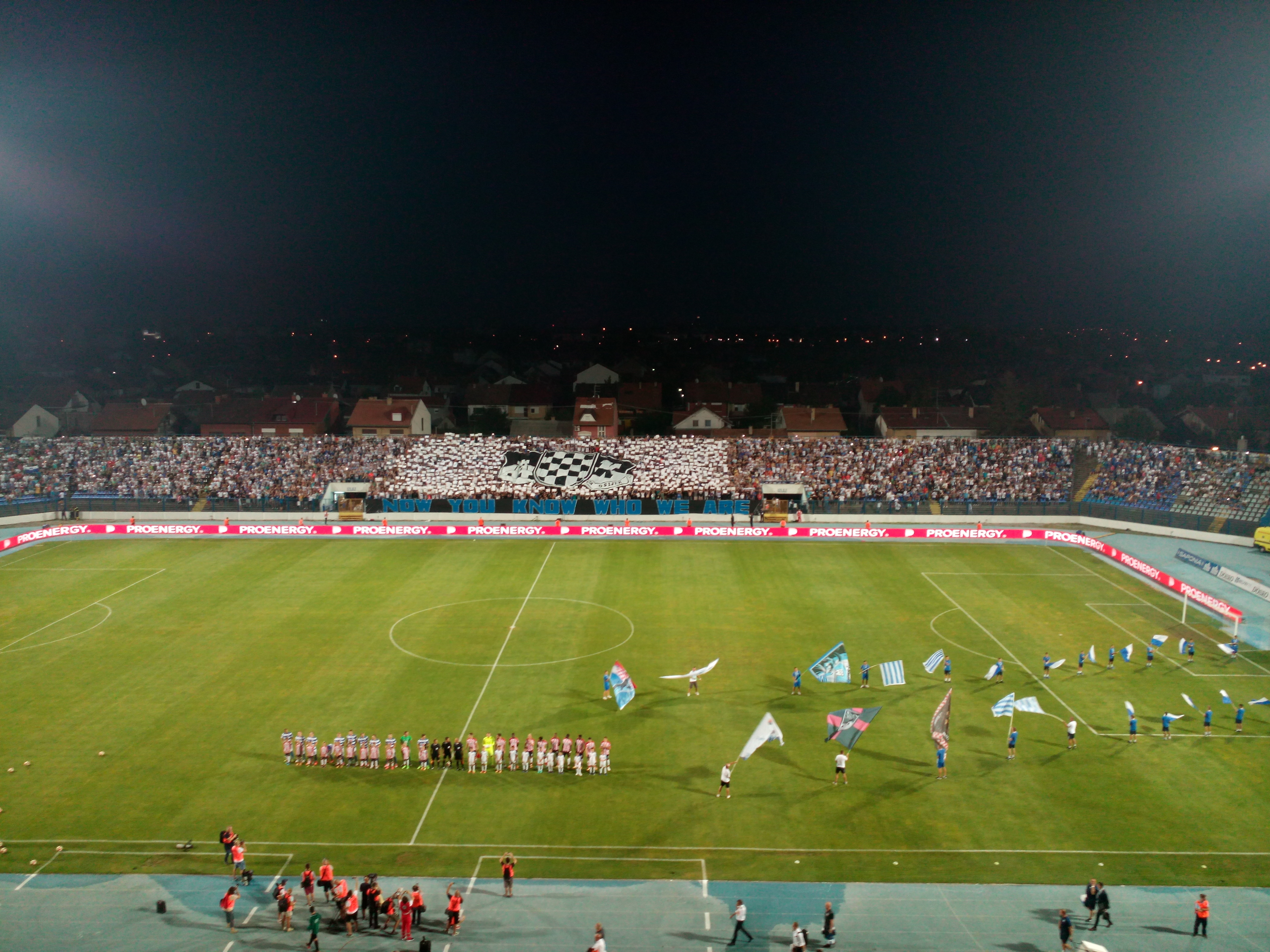|
1981–82 Yugoslav Cup
The 1981–82 Yugoslav Cup was the 34th season of the top football knockout competition in SFR Yugoslavia, the Yugoslav Cup ( sh, Kup Jugoslavije), also known as the "Marshal Tito Cup" (''Kup Maršala Tita''), since its establishment in 1946. The 1980–81 winners Velež failed to retain the trophy as they were knocked out in the first round by minnows Mogren. Dinamo Zagreb and the Belgrade-based Red Star, who finished as winners and runners-up in the 1981–82 Yugoslav First League, reached the tournament final. In the two-legged final Red Star won their 10th cup title after beating Dinamo 6–4 on aggregate. This was their first cup win since the 1970–71 edition. Surprise of the tournament were second level side Galenika, who managed to reach the semi-finals, knocking out the remaining two of the Yugoslav "Big Four" clubs Partizan and Hajduk Split in the process. Fuelled by their prolific goalscorer Slobodan Santrač, Galenika also had a successful league season as they ... [...More Info...] [...Related Items...] OR: [Wikipedia] [Google] [Baidu] |
Socialist Federal Republic Of Yugoslavia
The Socialist Federal Republic of Yugoslavia, commonly referred to as SFR Yugoslavia or simply as Yugoslavia, was a country in Central and Southeast Europe. It emerged in 1945, following World War II, and lasted until 1992, with the breakup of Yugoslavia occurring as a consequence of the Yugoslav Wars. Spanning an area of in the Balkans, Yugoslavia was bordered by the Adriatic Sea and Italy to the west, by Austria and Hungary to the north, by Bulgaria and Romania to the east, and by Albania and Greece to the south. It was a one-party socialist state and federation governed by the League of Communists of Yugoslavia, and had six constituent republics: Bosnia and Herzegovina, Croatia, Macedonia, Montenegro, Serbia, and Slovenia. Within Serbia was the Yugoslav capital city of Belgrade as well as two autonomous Yugoslav provinces: Kosovo and Vojvodina. The SFR Yugoslavia traces its origins to 26 November 1942, when the Anti-Fascist Council for the National Liberation of Yugoslavia wa ... [...More Info...] [...Related Items...] OR: [Wikipedia] [Google] [Baidu] |
HNK Hajduk Split
Hrvatski nogometni klub Hajduk Split, commonly referred to as Hajduk Split () or simply Hajduk, is a Croatian professional football club based in Split, that competes in the Croatian First League, the top tier in Croatian football. Since 1979, the club's home ground has been the 34,198-seater Stadion Poljud. The team's traditional home colours are white shirts with blue shorts and blue socks. The idea to form a football club was started by group of Split students who were studying in Prague. After observing a game between Slavia and Sparta Prague, the group gathered at the U Fleků tavern and talked of creating a football club at home. When they returned to Split, they put their plan in motion and Hajduk was founded on 13 February 1911. Between the early 1920s and 1940, Hajduk regularly participated in the Kingdom of Yugoslavia national championship. Following World War II and the formation of the Yugoslav league system in 1946, Hajduk went on to spend the entire SFR Yugoslavia ... [...More Info...] [...Related Items...] OR: [Wikipedia] [Google] [Baidu] |
FK Borac Banja Luka
Fudbalski klub Borac Banja Luka (Serbian Cyrillic: Фудбалски клуб Бopaц Бања Лука, ) is a Bosnian professional association football club, based in the city of Banja Luka, Bosnia and Herzegovina, and is the major part of the Borac Banja Luka Sports Society. Borac Banja Luka is one of the most popular football clubs in Bosnia and Herzegovina. The name ''Borac'' means "Fighter". Currently, Borac is a part of the Premier League of Bosnia and Herzegovina and plays its home matches at the Banja Luka City Stadium, which has a capacity of 10,030 seats. History Early years (1926–1953) The football club Borac Banja Luka was founded on 4 July 1926. Originally it was named ''Radnički sportski klub Borac'', which means Labour Sports Club Borac, Borac meaning "Fighter", and its roots come from the relation the club had with local labour movements during the first half of the 20th century. The club was founded by a group of football enthusiasts including the writer, ... [...More Info...] [...Related Items...] OR: [Wikipedia] [Google] [Baidu] |
Montenegro
) , image_map = Europe-Montenegro.svg , map_caption = , image_map2 = , capital = Podgorica , coordinates = , largest_city = capital , official_languages = Montenegrin , languages2_type = Languages in official use , languages2 = , ethnic_groups = , ethnic_groups_year = 2011 , religion = , religion_year = 2011 , demonym = Montenegrin , government_type = Unitary parliamentary republic , leader_title1 = President , leader_name1 = Milo Đukanović , leader_title2 = Prime Minister , leader_name2 = Dritan Abazović (acting) , leader_title3 = Speaker , leader_name3 = Danijela Đurović , legislature = Skupština , sovereignty_type = Establishment history , established_event1 = Principality of Duklja , established_date1 ... [...More Info...] [...Related Items...] OR: [Wikipedia] [Google] [Baidu] |
FK Budućnost Podgorica
Fudbalski Klub Budućnost Podgorica (Cyrillic: Будућност Подгорица, , lit. "Future") is a Montenegrin football club from Podgorica, Montenegro. It is competing in the Montenegrin First League. Its colours are blue and white. Founded in 1925, Budućnost was the Montenegrin club with most appearances in the Yugoslav First League, debuting in 1946. Due to the city being renamed during the communist rule in Yugoslavia, Budućnost was known as ''Budućnost Titograd'' throughout that era. Since Montenegrin independence in 2006, the club has won five Montenegrin First League titles and three Montenegrin Cups. They are the Montenegrin club with the most games and seasons in European competitions, winning the UEFA Intertoto Cup in 1981. The team produced many European top-class players among whom are the UEFA Champions League winning strikers Dejan Savićević and Predrag Mijatović. FK Budućnost is a part of Budućnost Podgorica sports society. History Period 1 ... [...More Info...] [...Related Items...] OR: [Wikipedia] [Google] [Baidu] |
Croatian Diaspora
The Croatian diaspora consists of communities of ethnic Croats and/or Croatian citizens living outside Croatia. Estimates on its size are only approximate because of incomplete statistical records and naturalization, but (highest) estimates suggest that the Croatian diaspora numbers between a third and a half of the total number of Croats. More than four million Croats live out of Croatia. The largest community outside Croatia are the Croats of Bosnia and Herzegovina, one of the constituent nations of that country, amounting to about 750,000. The Croatian diaspora outside Croatia and Bosnia and Herzegovina amounts to close to a million elsewhere in Europe, and to about 1.7 million overseas. The largest overseas community is reported from the United States at 1,200,000, Chile at 200,000, and Argentina with 250,000 people. In Western Europe, the largest group is found in Germany. The German census reports 228,000 Croats in Germany , but estimates of the total number of people with ... [...More Info...] [...Related Items...] OR: [Wikipedia] [Google] [Baidu] |
FK Teteks
FK Teteks ( mk, ФК Тетекс) is a football club from the city of Tetovo in North Macedonia. They are currently competing in the Macedonian Second League. History In 1946, there was a club from Tetovo called Šar Tetovo, and it competed in the Macedonian Republic League and Macedonian Cup. It won the Macedonian Cup two times in 1948 and 1950, and was successful in the Macedonian League. However, it was dissolved after a few years, mostly because of financial difficulties. Not much long after this, a new club was founded on the base of FK Šar, named Tekstilec. The club was founded in 1953, under the name FK Tekstilec. The founder of FK Teteks is the textile combine Teteks and because of this they are known as "Štofari" (Tailors). They were in the shadow of the older club FK Ljuboten (formed in 1919). FK Ljuboten's squad was full with homegrown players from Tetovo, while Teteks had the capability to attract the best players from Macedonia and wider from the former Fede ... [...More Info...] [...Related Items...] OR: [Wikipedia] [Google] [Baidu] |
NK Osijek
Nogometni klub Osijek ( en, Osijek Football Club), commonly referred to as NK Osijek or simply Osijek (), is a Croatian professional football club from Osijek. Founded in 1947, it was the club from Slavonia with the most seasons in the Yugoslav First League and, after the independence of Croatia in 1992, it is one of the four clubs that have never been relegated from the Croatian First League, the others being Dinamo Zagreb, Hajduk Split and Rijeka. History 1947–1976 The precursor to NK Osijek was founded on 27 February 1945 as NK Udarnik on the tradition of banned JŠK Slavija Osijek, which was founded in 1916 and played in the first jugoslav league 7 times between 1923 and 1941. Already in 1946, the club is merged with Jedinstvo, and changes its name to NK Slavonija. The conventional birthday of the club is considered to be the following year on the February 27, 1947, when NK Slavonija and Nk Bratstvo merge to form the FK Proleter. The first match played under that name come ... [...More Info...] [...Related Items...] OR: [Wikipedia] [Google] [Baidu] |
Penalty Shootout (association Football)
A penalty shoot-out (officially kicks from the penalty mark) is a tie-breaking method in association football to determine which team is awarded victory in a match that cannot end in a draw, when the score is tied after the normal time as well as extra time (if used) have expired. In a penalty shoot-out, each team takes turns shooting at goal from the penalty mark, with the goal defended only by the opposing team's goalkeeper. Each team has five shots which must be taken by different kickers; the team that makes more successful kicks is declared the victor. Shoot-outs finish as soon as one team has an insurmountable lead. If scores are level after five pairs of shots, the shootout progresses into additional " sudden-death" rounds. Balls successfully kicked into the goal during a shoot-out do not count as goals for the individual kickers or the team, and are tallied separately from the goals scored during normal play (including extra time, if any). Although the procedure for each ... [...More Info...] [...Related Items...] OR: [Wikipedia] [Google] [Baidu] |
1981–82 Yugoslav Cup
The 1981–82 Yugoslav Cup was the 34th season of the top football knockout competition in SFR Yugoslavia, the Yugoslav Cup ( sh, Kup Jugoslavije), also known as the "Marshal Tito Cup" (''Kup Maršala Tita''), since its establishment in 1946. The 1980–81 winners Velež failed to retain the trophy as they were knocked out in the first round by minnows Mogren. Dinamo Zagreb and the Belgrade-based Red Star, who finished as winners and runners-up in the 1981–82 Yugoslav First League, reached the tournament final. In the two-legged final Red Star won their 10th cup title after beating Dinamo 6–4 on aggregate. This was their first cup win since the 1970–71 edition. Surprise of the tournament were second level side Galenika, who managed to reach the semi-finals, knocking out the remaining two of the Yugoslav "Big Four" clubs Partizan and Hajduk Split in the process. Fuelled by their prolific goalscorer Slobodan Santrač, Galenika also had a successful league season as they ... [...More Info...] [...Related Items...] OR: [Wikipedia] [Google] [Baidu] |
Youth Day
National Youth Day is a holiday dedicated to the youths of a country. It is observed by 18 countries, on many dates throughout the year. The United Nations agreed on the date of 12 August in 1999 in South Africa. National Youth Day International Youth Day is an international observance on August 12 officially recognized by the United Nations.The UN General Assembly agreed on this date in 1999. Cameroon National Youth Day is a Public holiday, national holiday in |






